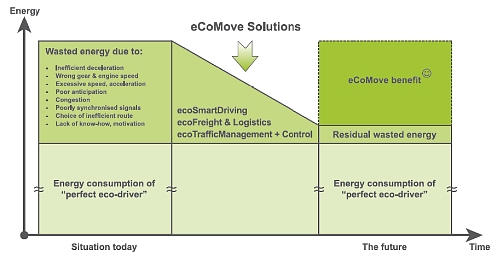“Green ITS” project targets 20 percent fuel savings
Last updated Jun 15, 2010 — 38 views eCoMove, a new EU research project, is developing “green ITS” (intelligent transport systems) technologies and applications for energy-efficient driving. The project plans to reduce fuel consumption and CO2 emissions by up to 20 percent, through the use of the latest cooperative communication, traffic control, and infrastructure technologies.
eCoMove, a new EU research project, is developing “green ITS” (intelligent transport systems) technologies and applications for energy-efficient driving. The project plans to reduce fuel consumption and CO2 emissions by up to 20 percent, through the use of the latest cooperative communication, traffic control, and infrastructure technologies.
According to the eCoMove project’s vision statement, this reduction in fuel consumption and carbon footprint will be the result of the “perfect eco-driver” traveling through the “perfectly eco-managed” road network (see diagram below).

eCoMove Project Vision
(click to enlarge)
A combination of cooperative applications for both eco-driving and eco-traffic management — optimized for a particular trip by a particular driver in a particular vehicle — will “approach the theoretical least possible fuel consumption and CO2 emissions without compromising the quality of mobility of people and goods,” the project’s website claims.
“In reality today, vehicles, drivers, and traffic management systems fall short of this ideal, and much fuel is wasted and CO2 emitted unnecessarily,” the project’s website continues. “The eCoMove innovations [will] target the two main sources of this avoidable fuel consumption, i.e. trips by private vehicles and those by goods vehicles, and tackle energy inefficiency in three domains: drivers’ behavior, route choice, and traffic management.”
Applications on the eCoMove project’s to-do list include…
- A dynamic ecoSmartDriving “virtual coach” that provides advice to adapt driving behavior for minimum fuel use, but also personalized recommendations based on driving experience for eco-driving optimization
- Dynamic eco-pre-TripPlanning and on trip Green Routing tools to select the lowest energy route
- An ecoDriver Coaching System that combines dynamic eco-driving support with training and incentive systems for commercial vehicle drivers
- An ecoFleet Planning & Routing application combining eco-driving support and logistics planning for commercial vehicles with energy-efficient traffic control measures, e.g. selective priority for trucks
- An ecoAdaptive Balancing & Control system that applies local energy-optimized strategies for traffic control, e.g. traffic light coordination based on a map of energy “hot-spots”
- ecoMotorway Management measures that combine eco-support of individual vehicles with energy-optimized traffic management measures on the interurban network
“These important innovations are enabled by the use of cooperative information exchange: drivers and road operators can benefit from extra, real time information — such as vehicle fuel consumption data, speed, route destination, traffic signal phase data, etc — which help them to drive more economically,” the project’s website explains.
The project’s activity will be partitioned into various sub-projects:
- Three will develop eco-oriented technologies and applications for car and truck driving; freight and logistics management; and cooperative traffic management and control.
- A fourth will be responsible for coordinating the other development sub-projects, as well for developing technologies required by all the sub-projects.
- Another sub-project will be assigned the task of validating the eCoMove project’s developments; assessing their potential impact of eCoMove on driver behavior, mobility, traffic network efficiency, and environmental issues. This sub-project will also be responsible for examining the costs and benefits of deployment.
A proper evaluation of cooperative traffic management requires a “high penetration of equipped vehicles,” which cannot be achieved by limited field tests, the project notes. Therefore, the project plans to create a simulation environment through which its applications can be tested and validated.
Project funding and management
The eCoMove project will run from April, 2010 through March, 2013. It is funded by a 13.7 million Euro grant from the European Union 7th Framework Programme of Research and Technological Development, Theme 3: Information and Communication Technologies, and is being coordinated by ERTICO – ITS Europe.
Further details are available on the project’s website.